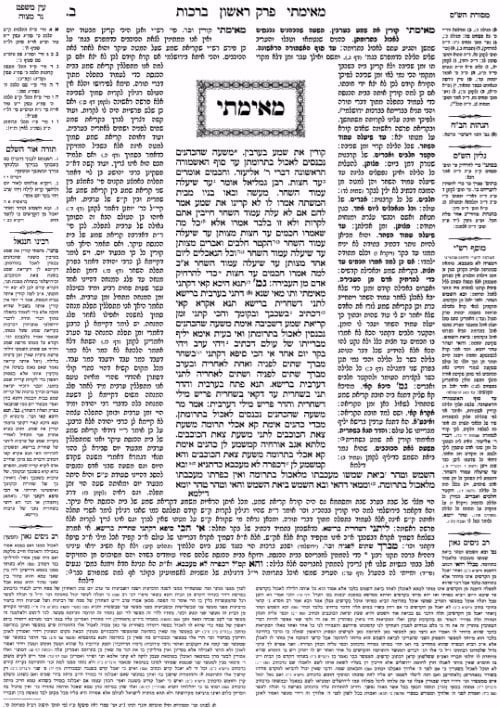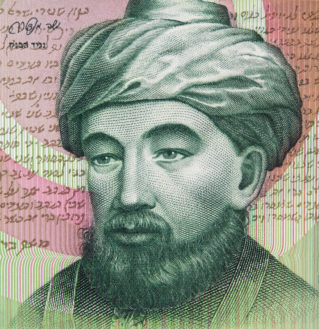I have been listening to a new podcast recently, it is called 'For Heaven's Sake' and created by an Israeli American charity called the Shalom Hartman Institute.
Mostly the format is two men, Doniel Hartman PhD, academic, philosopher, rabbi and president of the organisation (also son of the founder, Shalom) and Yossi Klein Ha-Levi an Israeli American writer, journalist and member of the faculty.
The two discuss a topic which they feel relevant to the current Jewish narrative, for example, the relationship with the Palestinian People, the Holocaust, Anti-Semitism and so on. They then listen to a rabbinic analysis by US based scholar Elana Stein Hain. Elana is deeply-versed in Jewish texts including the Old Testament as well as the Talmud – the commentary composed during one of the Jews' many exiles, this time it was in Babylon (Iraq).

Babylonian Talmud C. 12th Century
They talk about all sorts from a Left-Leaning dimension although their narrative is more sophisticated; suffice it to say they are non-partisan – for example, it is clear they think Trump a 'meshugine' (my words) and Biden the right guy for the job, yet they won't state this explicitly. Their views on Bini, the Palestinians and the rest of the Arab world are equally Left of Centre.
Anyway.
I want to get to the cows.
Possibly my favourite section of the podcast beyond listening to the learned to and fro of Doniel and Yossi is Elana's analysis.
It takes me back to my time at school in Israel.
There is a separate subject taught in the schools called 'Tanach' which is The Old Testament, it stands for, Torah (the Five Books of Moses), Neviim (the Prophets) and Ketuvim (the Writings) – everything else, the Books of Chronicles, Kings and Judges, for example.
If you take the bible at face-value, it doesn't tell you much. Sure, it is a pseudo-historical document (written hundreds if not thousands of years after the fact), it also contains the 613 Mitzvot (Commandments/rules).
If that was the extent it wouldn't be as profound a text, it wouldn't keep tens of thousands of scholars studying over the centuries.
It is the commentary or the Mishnah and Gemara, written by the rabbis both during their exile and their time in the Land of Israel that are fascinating.

Talmud with commentary
Essentially, these are the reflections of people such as Rashi (Rabbi Shlomo Yitzchaki), Rabbis Akiva and Hillel and The Rambam (Maimonides), where sections, often phrases, as little as a few words are taken and chewed over, analysed, weighed and interpreted.
If you open the Talmud you see the central text surrounded by the various commentaries from the ages – it is these discussions or lessons that are the real stuff that are the Jewish tradition.
In school, this was something I loved. One example I remember was the discussion of an apple tree – if it grows in your garden, the apples are yours, yet if the tree stretches into your neighbour's garden, even though the tree is yours, they can eat the apples.
Minutiae like this, dissections of everyday life.
And now the cows.
The story relates to a discussion about water.
Last week in Israel it was 40 degrees centigrade.
Water is a major topic in the Middle East.
In the olden times one group of people had access to a well. The well had enough water to allow that group to drink and survive.
Now imagine, another tribe appeared and asked for access to the water. If they drink, there might not be enough for both groups.
What should you do?
Tell them to find their own well? Let them die? Share the water and risk mutual harm?
Most would argue that in times of difficulty, the right thing is to share the water.
The next question is, if the tribe has enough water for themselves and their cattle, what happens when the others ask for a drink. Do you share? This might risk the death of your cattle. Your people might starve, your favourite cow might perish, then what? Well, the life of a person is surely more important than the life of a cow although the equation is more complicated than the first.
Now is the tricky part.
What if the first tribe has enough water for themselves, their cattle, and adequate to wash their clothes. On this occasion, should they share?
Of course! You say, clothing isn't human life, water must be shared. Who cares about dirty pants?
And this is the lesson.
As although superficially, we argue that the water should be shared, what is the reality?
The reality when you look around, not in ancient times, but today, we have people struggling everywhere, at home and abroad. Homelessness, inequality, disease, poverty. Planet Earth has never been more productive and yet the gap between those who have and have not has never been wider.
And what do we do?
Do we share our wealth? Do we forsake our summer holiday, new gadget, or car (the dirty clothes) and share our riches or, do we look the other way?
Yes, we look away.
For although the ethical perspective is to share, the reality is different.
It is easy to look at a hypothetical and suggest actions or solutions, when this affects you directly, the calculus alters. (Yes, you vote Tory/Republican).
The lesson?
We are all limited by our experiences and values. What is nice or right to do isn't always what we do and, when we judge others, 'look at them, they didn't share their water/resources/wealth' we should first look at ourselves and the ways in which we behave before considering others.
You can find a link to the podcast here.

Rambam - Maimonides
No comments:
Post a Comment